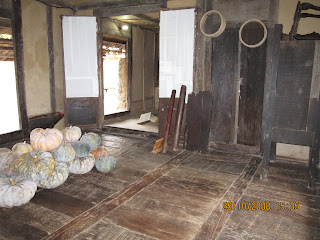Traditional JeJu
Friday, November 7, 2008 by LookattheKite
 “honjauopsoye” is the word of JeJu island for saying hello.
“honjauopsoye” is the word of JeJu island for saying hello.As jeju island Is little bit far from South Korea, it has many dialects that people of the peninsula cannot understand.
Anyway, this is me with “dolharoobang”. This stone sculpture is easily seen and is the constitution of JeJu.
Jeju is a volcanic island. So there’s trillions of whinstone. With those whinstones people created this “dolharoobang” in the belief that those stones would scare off ghosts and bad spirits.
But don’t you feel that dolharoobang’s face looks so calm and peaceful?
 A wooden sculpture of Dolharoobang.
A wooden sculpture of Dolharoobang. This sculpture is similar to Dolharoobang. It is called "Jungsung". Mostly, two Jungsungs, a woman and a man is placed at the entrance of villages in order to scare off ghosts and bad spirits and keep the villagers safe from diseases and calamities. Its face, unlike that of Dolharoobang looks very stern and scary.
This sculpture is similar to Dolharoobang. It is called "Jungsung". Mostly, two Jungsungs, a woman and a man is placed at the entrance of villages in order to scare off ghosts and bad spirits and keep the villagers safe from diseases and calamities. Its face, unlike that of Dolharoobang looks very stern and scary.
 The traditional house of Jeju, which can now only be found in museums and special places. Since Jeju island has strong winds, the roof is very thick.
The traditional house of Jeju, which can now only be found in museums and special places. Since Jeju island has strong winds, the roof is very thick. Inside the house there's 2~3 room and in one room a man is making a basket out of straw.
Inside the house there's 2~3 room and in one room a man is making a basket out of straw.  This is pottery used in the kitchen.
This is pottery used in the kitchen.
The inside of the traditional house. There's heaps of pumpkins on the leftside.

This is a real size model cow that portrates how it was used to help farmers. As Korea had been agricultural country, the role of cow was very important and possessing cow meant wealth.
People used cow to cultivate and after that they sold cows to make money for their kids to send them university.
 Jeju citizens raised pigs in their backyards so those pics can eat away people's feces. And, fortunately those pigs are such great workers!
Jeju citizens raised pigs in their backyards so those pics can eat away people's feces. And, fortunately those pigs are such great workers!
 Jeju citizens raised pigs in their backyards so those pics can eat away people's feces. And, fortunately those pigs are such great workers!
Jeju citizens raised pigs in their backyards so those pics can eat away people's feces. And, fortunately those pigs are such great workers!